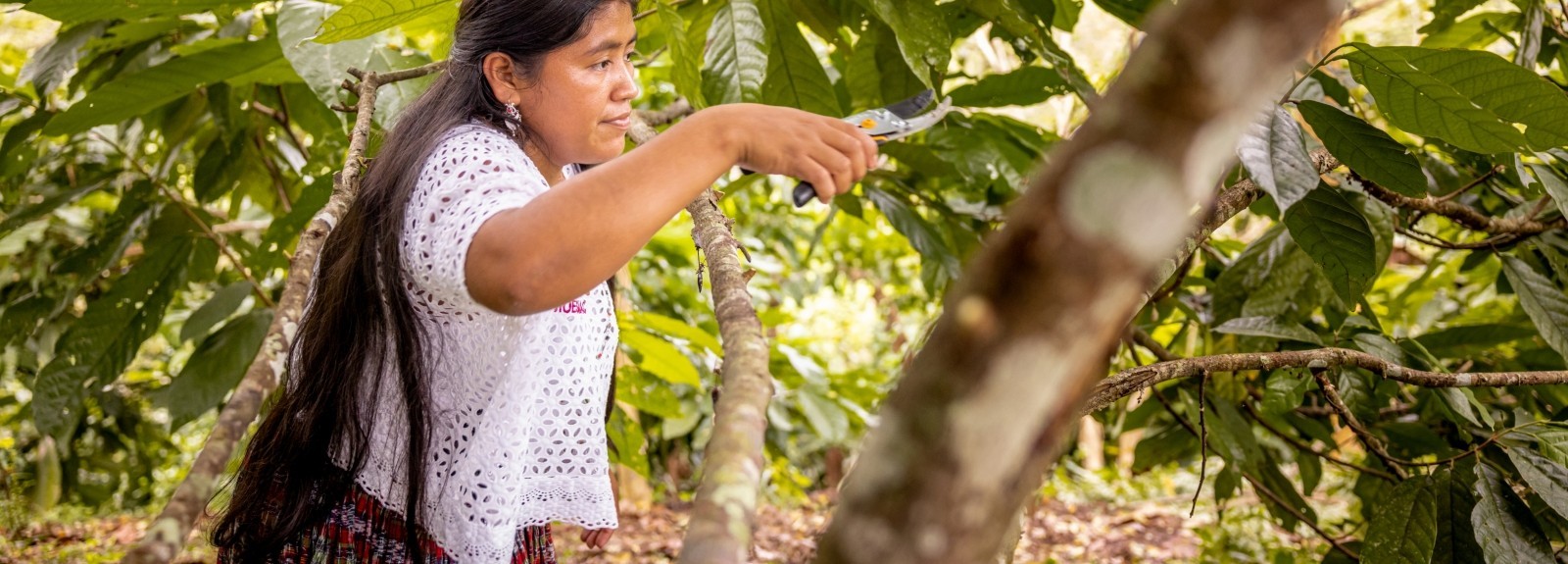Poverty, food insecurity, unemployment, climate shocks and the threat of violence are pushing an estimated 378,000 people in Central America to make their way to the United States every year, according to a recent joint report.
To address some of these root causes of migration, Corus organization Lutheran World Relief partners with private companies and local non-governmental organizations, including farmer cooperatives, in El Salvador, Honduras, Guatemala and Nicaragua to advance rural development through programs in agriculture, youth entrepreneurship and climate resilience.
Agricultural development for income generation
In the San Marcos region of Guatemala, where chronic malnutrition and poverty persist at devastating levels, we collaborate with local partner FundaSistemas in the Improving Health and Nutrition in Guatemala’s Western Highlands project. Applying innovative behavior change methodologies, the project utilizes home visits, technical assistance and an arts-based community development (ABCD) curriculum to promote healthy food consumption, agricultural diversification, maternal and child health, women’s leadership, and water, sanitation and hygiene (WASH) best practices.
“The goal is to no longer have to think about migrating,” says Roselvina De León González, a community promoter from Tacaná who now leads an oyster mushroom microenterprise after receiving technical training from the project. The mushrooms are not only highly nutritious but are an effective way to provide income for local families because of their high market value. Roselvina proudly leads a women’s agriculture group and has helped the community to see that “women can also work and generate income for our families.”
Rosaura, a community agriculture promoter who works alongside Roselvina, adds, “We already know we can generate income here so that we no longer have to emigrate. Our goal is to be a large company and not only sell here in the municipality, but perhaps to export one day.” With support from the project, the next generation of producers in San Marcos are strengthening their capacity to grow small agricultural enterprises, allowing them to improve nutrition and earn an income within their community.
Roselvina De León González shows off her oyster mushroom greenhouse module.
Private sector collaboration
Lutheran World Relief’s engagement with the private sector also works to overcome the economic causes of migration. Lutheran World Relief leads cacao programming for the six-country USDA-funded Maximizing Opportunities in Coffee and Cacao in the Americas (MOCCA) project, helping farmers sell more at better prices, improving farmer production and enhancing sector coordination to drive competitiveness and growth. Through MOCCA, we partner with companies that not only want to invest in improving cocoa quality and yields, but also in the systems that make those improvements possible for the future, such as higher prices, good genetic material for planting, and more direct, feasible and profitable supply chains for smallholder farmers.
Through both MOCCA and our impact investing fund Ground Up Investing, Lutheran World Relief has made strategic collaborations with several companies in the cocoa and chocolate industry including women-owned Uncommon Cacao that has a Guatemalan production subsidiary, Cacao Verapaz. Their business model is built around the idea that de-commoditizing cacao and introducing radical transparency to the supply chain will drive change in the industry and improve farmer livelihoods. “We provide technical assistance to farmers so that they can increase their productivity…We want Guatemala’s name to be known globally because we produce a high-quality cocoa,” says Teddy Ruiz, Cacao Verapaz’s General Manager.
Teddy Ruiz, General Manager of Cacao Verapaz, displays cacao beans ready for export that were purchased from one of the six cacao producer associations that the company partners with.
In Guatemala, MOCCA trains over 900 cocoa producers, of whom 40% are women. One of the associations of smallholder cacao farmers that we partner with through MOCCA in the Alta Verapaz region is the Association of Integrated Development "OX EEK" Santa Maria Cahabón (ADIOESMAC). ADIOESMAC, whose members are indigenous Q'eqchi’ Maya, champions inclusive leadership with women, men and youth involved in all areas of cacao production, from business administration to community production processes.
Pedro Tiul Caal, a cacao producer and ADIOESMAC agriculture promoter, talks about the importance of MOCCA’s technical support for long-term growth. “The association can prepare for the future, for future generations. We, as parents, are grasping for something to share with our children… I believe that young people are being given an opportunity to stay close to their families.”
With Lutheran World Relief’s support, ADIOESMAC established a network of youth community trainers who provide technical assistance to partner families so they can share the cooperative’s progress. Young people have also been critical to expanding the use of Lutheran World Relief’s Cacao Móvil (Mobile Cocoa), an open-source application designed to help farmers, cooperatives and agricultural extension workers improve crop production and processing while promoting inclusive growth, equity and social justice.
Pedro Tiul Caal, a cacao producer and ADIOESMAC agriculture promoter, prunes a cacao tree.
Looking forward
Recognizing that livelihood creation for youth in Central America will depend heavily on the agriculture sector, Lutheran World Relief and the Corus International family will continue to focus on private sector collaboration and youth-led enterprises. By championing co-creation with local partners to strengthen market-based agricultural development, we are committed to addressing the root causes of migration, poverty and malnutrition through a holistic approach that advances community resilience and long-term food security.

